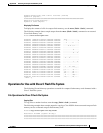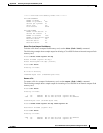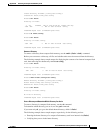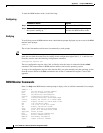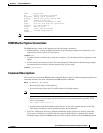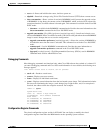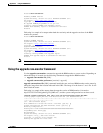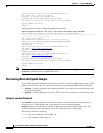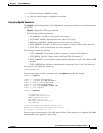
C-3
Cisco VG224 Voice Gateway Software Configuration Guide
OL-5005-01
Appendix C Using the ROM Monitor
Entering the ROM Monitor Mode
reset system reset
set display the monitor variables
showcookie display cookie information
showfpga display the current selected FPGA
stack produce a stack trace
sync write monitor environment to NVRAM
sysret print out info from last system return
tftpdnld tftp image download
unalias unset an alias
unset unset a monitor variable
xmodem x/ymodem image download
rommon 2 >
Note You can abort any command by pressing the Break key at the console.
ROM Monitor Syntax Conventions
The ROM monitor syntax in this appendix uses the following conventions:
• Square brackets [ ] denote an optional element. In the following example, the element abc is not
required, but you can specify it if you choose:
command [abc]
• If a minus option is followed by a colon (for example, [-s:]) you must provide an argument for the
option.
• A term in italics means that you must fill in the appropriate information. In the following example,
you replace the term in italics with the interface type you are using:
command
type interface
Command Descriptions
This section lists some useful ROM monitor commands. Refer to the Cisco IOS configuration guides and
command references for more information on ROM monitor commands.
boot or b—Boot an image.
–
Boots the first image in flash memory.
–
flash:/slot0 [name] boots the Cisco IOS software from flash memory.
Note The above command is not available on the Cisco VG224.
–
filename tftpserver boots from the specified file over the network from the specified TFTP
server. For example:
boot cvg224-i-mz 172.15.19.11
–
filename boots from the boothelper image because it does not recognize the device ID. This
form of the command is used to netboot the image named filename.
• The Cisco VG224 does not have a dedicated boothelper image ([rx]boot) as used by some other
Cisco routers. With the Cisco VG224, the first image in flash memory is invoked as the default
boothelper image anytime the ROM monitor does not recognize the device ID in the boot command.



